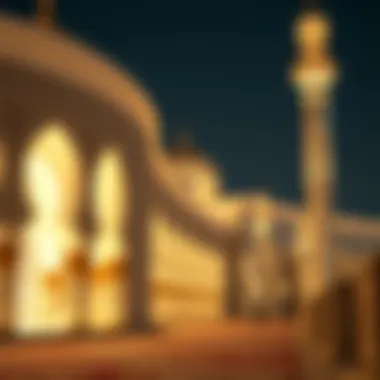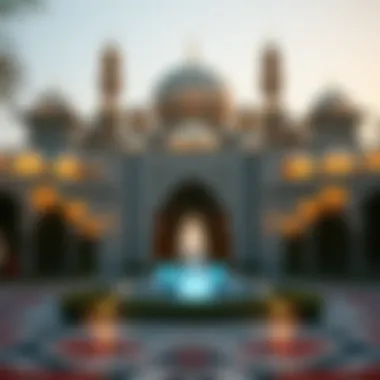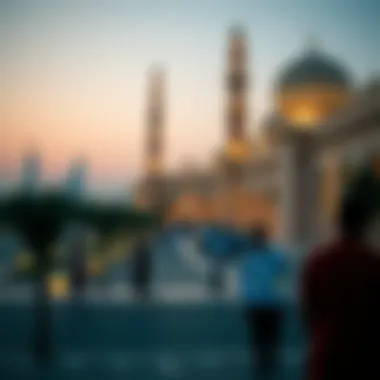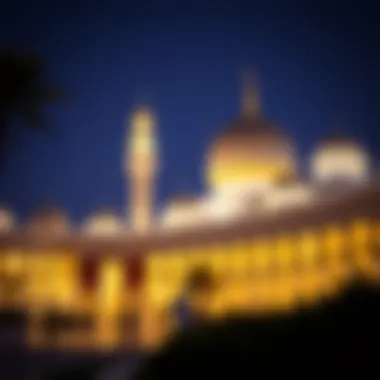Eid 2024 Holidays in the UAE: Cultural and Economic Insights


Intro
Eid in the UAE is as much a cultural celebration as it is an economic driver. As 2024 approaches, the anticipation builds not just among families gathering for the festival, but also among real estate agents, investors, and developers keen to understand the implications of this significant holiday period.
The holiday’s timing affects the market dynamics in various ways. With fluctuations in public holidays, insights into consumer behavior, and the social fabric of the UAE being intertwined with celebrations, one can glean important trends that impact the real estate sector, especially in bustling hubs like Dubai.
In this narrative, we will delve into the significance of the Eid holidays in 2024, the celebration’s regional nuances, and how these aspects relate to the real estate market's ebb and flow. Analyzing current trends will provide an understanding of buyers' and sellers' psyche and help develop pragmatic strategies for navigating the market.
Let’s take a plunge into the Market Analysis.
Understanding Eid in the UAE
Eid holds a particularly esteemed place in the cultural and religious landscape of the UAE. For many, it’s not just a holiday; it's an occasion steeped in tradition, family ties, and community spirit. Understanding Eid in the UAE sets the stage for recognizing its profound significance in everyday life, particularly as it relates to various spheres, including the economy, social fabric, and community engagements.
The essence of this holy day transcends mere celebrations marked by festive meals and prayers. Rather, it embodies values of generosity, compassion, and cultural unity—values that resonate deeply within Emirati society. These elements form the bedrock of the significance of Eid, making it an essential centerpiece in the annual calendar that influences local customs and practices substantially.
One could argue that the holiday’s importance is multifaceted:
- Cultural Identity: Eid serves as a time for individuals and families to reconnect with their roots, strengthening their cultural identity amid a rapidly modernizing environment.
- Community Cohesion: It fosters a sense of belonging among communities, bridging gaps between diverse populations. This unity plays a pivotal role in the increasing multiculturalism of the UAE.
- Economic Activity: With countless businesses gearing up for the holiday, Eid generates economic activity across various sectors, particularly in retail, hospitality, and real estate. Homeowners and investors should take special note of this, as seasonal variations can influence property values and consumer behaviors.
By exploring the various facets of Eid, including its cultural significance, religious observances, and historical context, one can gain a deeper appreciation for how this holiday shapes social interactions and economic dynamics in the UAE.
Cultural Significance
Eid is a tapestry woven from historical narratives and lived experiences, where each thread reflects various customs and traditions. The holiday emphasizes the core principles of Islam while integrating local traditions that resonate with the Emirati spirit.
Celebrations often involve wearing new clothes, visiting relatives, and preparing traditional meals to share with neighbors and friends. This communal aspect not only enriches the holiday but also reinforces social bonds—both within families and among different cultural groups.
Moreover, it is customary to give Zakat al-Fitr, a form of charity, ensuring those less fortunate can partake in the festivities. Such acts underscore how the celebration promotes empathy and social responsibility.
Religious Observances
The observance of Eid in the UAE is marked by unique rituals that reflect deep-seated beliefs and practices. Both Eid al-Fitr, which marks the end of Ramadan, and Eid al-Adha, commemorating the willingness of Ibrahim to sacrifice, are respected with specific rites.
Prayers at mosques and community spaces bring together hundreds, if not thousands, creating a profound communal experience. This collective act of worship is often followed by shared meals and community feasts, solidifying the religious undertone of the occasion amid joyous celebrations.
It's essential for real estate professionals and others to recognize the increased demand for properties that can accommodate family gatherings and community celebrations during these significant days.
Historical Context
Delving into the historical context of Eid in the UAE reveals layers of tradition and adaptation over time. Originating from Islamic teachings, which date back centuries, Eid has evolved into a celebration that reflects the rich tapestry of Emirati history.
From the early days marked by simple family gatherings to the modern-day festivities that include grand fireworks displays and public concerts, the evolution has not tarnished but rather enriched the holiday’s essence.
Understanding this history provides valuable insights into how different generations perceive and celebrate Eid. It offers a window into the socio-economic changes from the traditionally tight-knit communities to the vibrant, multicultural society of today.
In summary, understanding Eid in the UAE is essential for grasping its cultural depth and economic implications. By acknowledging its significance to the identity and social dynamics of the region, stakeholders in various sectors can better navigate the complexities associated with this vibrant celebration.
Eid Holidays Timeline for
Understanding the timeline of Eid holidays in 2024 is crucial for numerous stakeholders in the UAE, especially in the realm of real estate. The specific dates for Eid can shape various decisions from travel plans to marketing strategies. With a significant population anticipating these holidays, knowing the schedule helps businesses prepare for the influx of visitors and the patterns of consumer behavior during this time. This timeline not only influences immediate economic activities but also allows for long-term planning in various sectors.
Official Dates Announced
The official announcement of Eid dates typically comes from the moon sighting committees, which confirm the end of Ramadan and the start of Eid. For 2024, Eid al-Fitr is expected to fall on April 10, but the exact date may vary based on lunar observations. Each year, the anticipation surrounds these announcements, as families and businesses alike gear up for celebrations.
"The sighting of the moon marks not just the end of fasting, but the beginning of festivities filled with joy, family gatherings, and shared meals."
The dates significantly dictate market dynamics. From the real estate sector perspective, knowing when families will gather and celebrate is valuable. Investors might choose to highlight properties suited for family gatherings or events during this period. Transparency about these timelines allows real estate agents to capitalize on market conditions effectively.
Expected Variations Across the UAE
While the UAE maintains a largely uniform approach to holidays, slight variations can exist between its emirates. Dubai, for instance, might hold grand public events and fireworks, while Abu Dhabi may lean toward more community-based gatherings. In smaller emirates like Fujairah or Ajman, one might find local traditions embedded in the celebrations, often less commercialized.
- Dubai: Expect bigger events and fireworks. The Burj Khalifa often becomes a focal point for celebrations.
- Abu Dhabi: More family-oriented gatherings, with cultural traditions playing a strong role.
- Sharjah: Activities are often infused with artistic and cultural expressions not seen in larger cities.


Real estate agents should also be mindful that certain areas will see heavier foot traffic. Agents might benefit from positioning properties closer to these major celebration spots, as families may wish to live near or rent homes that can accommodate larger gatherings during Eid. This knowledge lends itself to strategic marketing on platforms like Facebook and LinkedIn, where active listings can be promoted to an eager audience.
Impact on Local Economy
Eid, one of the most significant festivals for Muslims, brings with it a wave of economic activity that permeates throughout the UAE. This period is not just a time for celebration; it has measurable impacts that stretch from consumer spending to sector-specific trends. By grasping these dynamics, real estate agents, investors, and homeowners can better navigate this pivotal season.
Consumer Spending Trends
During Eid, consumer spending typically experiences a noticeable uptick. Families often set aside budgets for gifts, festive meals, and clothing, which in turn positively influences various sectors. In the years leading up to 2024, trends have shown that people are allocating a larger portion of their disposable income towards experiences and luxury items.
For instance, malls in Dubai and Abu Dhabi are brimming with shoppers looking for the latest fashions or the perfect gift. Promotions and discounts are rampant during this time, attracting consumers eager to get the best deals. This heightened purchasing behavior is not merely a trend; it's a testament to the cultural significance of spraying joy through generosity.
The influx of shoppers leads to increased foot traffic, which many businesses depend on to bolster their revenues during this short yet impactful period. As a result, real estate investments, especially in retail outlets, can see significant returns as they are strategically positioned to tap into this surge.
- Key Insights on Consumer Spending:
- Increased budgets for gifts and experiences.
- Surge in foot traffic in retail spaces.
- Impact of promotions and discounts on sales.
Hospitality Sector Insights
The hospitality sector often sees a bloom during the Eid holidays. Hotels and restaurants are usually booked to the brim with locals and tourists celebrating the occasion. Notably, popular destinations, like Jumeirah Beach Hotel or The Ritz-Carlton, report a substantial increase in bookings, showcasing the importance of this festival for their annual revenue.
Food and beverage establishments, in particular, curate special menus to honor this festive period. Traditional dishes are often highlighted, creating culinary experiences that resonate with the essence of Eid. While tourists are drawn to these cultural offerings, locals often indulge in staycations or family gatherings at restaurants, thereby bolstering the sector further.
"The hospitality sector turns lively during Eid, drawing both residents and tourists to experience the customs through food and festivities."
- Hospitality Highlights:
- Increased bookings at hotels and resorts.
- Special festive menus to attract diners.
- Staycation trends among locals.
Real Estate Market Reactions
Eid brings a unique rhythm to the real estate market; while long-term trends govern everyday activities, this period can create short-term flurries of activity. Potential buyers and investors often reassess their positions during Eid, taking advantage of the holiday mood to engage with real estate opportunities. Open houses and property exhibitions often capitalize on this festive spirit, attracting more attendees than usual.
Moreover, rental properties can see a spike due to travelers seeking temporary housing. Areas near popular attractions or cultural events become prime spots for short-term leases, which can lead to improved rental yields for property owners.
- Trends in Real Estate:
- Increased interest in property during Eid.
- Short-term rental opportunities for visitors.
- Open houses garnering larger crowds.
Given these insights, it is essential for stakeholders within the real estate sector to remain agile and responsive to the changes that Eid brings. Understanding these economic implications allows for informed strategies that align with the vibrant activity during this festive time.
Real Estate Considerations During Eid
The Eid holidays present a unique landscape for the real estate market in the UAE. This period often sees a noticeable shift in both buyer behavior and market activity, making it essential for real estate agents, investors, and developers to understand these dynamics. During Eid, many families prefer to celebrate and spend quality time together, which can influence decisions related to property buying and selling. As a result, there's typically an uptick in property showings right before the holiday, as buyers aim to finalize their purchases ahead of family get-togethers.
Buying and Selling Activities
Buying and selling activities during Eid can take on a different tone than at other times of the year. The excitement and festivity surrounding the holiday can serve as a double-edged sword for the market. On one hand, sellers may be motivated to list their properties during this time, hoping to attract buyers who are in a more positive and giving mood, reflective of the season’s spirit. On the other hand, buyers might be hesitant to engage in serious negotiations, preferring instead to celebrate and divert their focus elsewhere.
"Real estate agents need to tailor their strategies around these seasonal delays and surges in activity to capture interest effectively."
An effective strategy could involve hosting property viewings that accommodate festive schedules. Potential buyers might be interested in properties that can host large family gatherings, such as those with spacious living areas or gardens. Tailored marketing efforts that highlight these features can appeal to the festive buyer demographic.
Investment Opportunities
Eid is not only a time for personal reflection and family reunions; it can also act as a strategic period for smart investments in real estate. The festive season might showcase certain areas of the UAE where demand surges, often because of cultural events or increased local attractions. Savvy investors often keep an eye on these trends. Areas like Dubai, which host several large-scale festivals, see a natural influx of visitors and residents, driving demand for short-term rentals and long-term leases alike.
Additionally, with the increased foot traffic during Eid, properties that are ideally positioned close to community centers or malls could see a rise in desirability. Investors should be prepared to assess neighborhood dynamics and think about how property value might shift post-Eid.
In summary, the Eid holidays can act as a pivotal point for real estate activities in the UAE. With the potential for both buying and selling activities to shift markedly during this time, it’s critical to grasp the implications that Eid has on market movements and investment opportunities. Keeping a finger on the pulse of both buyer sentiments and market trends during this festive time can unlock valuable possibilities.


Regional Variations in Celebrations
When discussing Eid in the UAE, it's crucial to recognize how diverse the celebrations can be across different regions. Each emirate brings its own distinct flavor to this important holiday, influenced by cultural traditions and population demographics. Understanding these regional variations sheds light on the broader narrative of how Eid shapes societal interactions and economic activities, making it a relevant topic for homebuyers, developers, and real estate agents.
Celebrations in Dubai
Dubai takes the spotlight during Eid, as it often hosts some of the grandest celebrations. The city, known for its modern architecture and vibrant nightlife, has events that attract both residents and tourists. Streets are often decked out with lights, and shopping malls like The Dubai Mall feature festive decorations and special deals.
The Burj Khalifa lights up the night sky with spectacular firework shows that draw thousands. Beyond the fireworks, community events are held in parks and public places. Emirati folklore performances, including traditional dances like the Al Ayallah, are showcased, reflecting the deep-rooted traditions of the area. Food stalls serving local delicacies further enhance the family-friendly atmosphere, making it perfect for socializing and strengthening community bonds.
Additionally, Dubai's real estate market sees a surge in activities during Eid. Many investors and homebuyers take advantage of the festive mood to explore properties, influenced by special promotions offered by developers.
Other Emirates and Their Unique Practices
Other emirates, while still celebrating Eid, do so through unique cultural lenses that paint the holiday in varied hues. For instance, in Abu Dhabi, the capital city, official celebrations often include national displays and parades highlighting the UAE's heritage and achievements. The Emirates Palace is a focal point, hosting events that attract families and expatriates alike.
In Sharjah, the emphasis on family-friendly activities often means you’ll see more traditional markets and community events. The Sharjah Eid Festival often includes arts and crafts, showcasing local artisans, and promoting cultural awareness amongst younger generations.
Then there's Ras Al Khaimah, where local customs take precedence. Celebrations here may feature traditional folk songs and storytelling sessions, allowing locals to transmit their heritage to the youth. In Ajman and Fujairah, simpler gatherings and barbecues with family and friends are the norm, underscoring the importance of togetherness and celebrating with loved ones.
Each emirate adds its own twist to the fabric of Eid celebrations. This distinction enhances the appeal of the UAE as a travel destination and a focal point for economic activities.
"Understanding local variations in celebrations enriches the cultural fabric of the UAE, making it vital for real estate professionals to consider these aspects in their market strategies."
In essence, recognizing these variations is not merely about appreciating the holiday itself but also offers insights for investors and developers to encourage community-focused projects, catering to the diverse cultural landscapes of the UAE.
Travel Trends During Eid
Eid holidays are not just moments of celebration but also major travel events influencing patterns both within the UAE and beyond. Understanding travel trends during Eid is crucial, especially for real estate professionals, as they highlight demographic movements and consumer behaviors that could affect the real estate market. This section will explore two main areas: the flow of travelers within the country and how UAE residents plan their trips abroad.
Domestic Travel Insights
During Eid, many families in the UAE take advantage of the extended holidays to explore the beauty of the nation. Travelers flock to popular destinations, leading to a surge in domestic tourism. Places like Abu Dhabi, Dubai, and Sharjah become bustling hubs full of activity.
- Key Destinations: It's common for families to vacation in renowned resorts or traditional spots such as Al Ain or Fujairah. With a mix of beach retreats and cultural attractions, travelers have a wide variety to choose from.
- Peak Travel Periods: Eid-related travels typically see a spike during the first couple of days of Eid, as individuals looking to celebrate with family venture out. This means heavy traffic on major highways and busy checks at domestic airports.
- Accommodation Demand: Increased domestic travel leads to a high demand for hotel bookings, particularly in luxury accommodations. These establishments often provide festive packages, enhancing the appeal for families looking for memorable experiences.
The peak travel period during Eid can lead to over 30% increase in hotel bookings across popular sites in the UAE.
International Travel Patterns for UAE Residents
As the UAE continues to strengthen its global ties, international travel during Eid reflects both cultural significance and personal connection. Families often seek to reconnect with relatives living abroad or simply to enjoy a holiday in a different country, especially during this festive period.
- Popular International Destinations: Countries such as Turkey, Egypt, and Malaysia are favored due to their cultural resonance and the warm reception for families. These nations have become second homes for various expats settled in the UAE.
- Travel Booking Trends: Many UAE residents book their tickets months in advance, hoping to secure the best fare and accommodation. Therefore, travel agencies might offer special packages during this time as families plan for their Eid celebrations away from home.
- Influence of Social Media: Digital platforms play a role in shaping international travel trends during Eid. Social media campaigns showcasing beautiful destinations influence many travelers' decisions.
The significance of these travel patterns extends beyond personal enjoyment and into economic realms, particularly impacting the hospitality sector and related services, which may hint at real estate developments in these tourism hotspots.
Cultural Events and Activities
Cultural events and activities during Eid in the UAE play a critical role in shaping the overall festive atmosphere. They not only enhance community bonds but also significantly contribute to the local economy, particularly in sectors such as tourism and real estate. Eid serves as a platform for showcasing traditional customs, fostering social cohesion among different cultures and communities. It’s during this time that individuals and families gather to celebrate, reflecting a deep sense of belonging and heritage.
Events such as community bazaars, exhibitions, and cultural performances offer various advantages. For instance, these gatherings provide a unique chance for local artisans and businesses to showcase their talents and produce. This not only promotes the local culture but enhances consumer engagement, encouraging spending within the community. Beyond commerce, cultural events like poetry readings or traditional music nights offer residents and visitors a chance to connect emotionally with the essence of Eid.
Moreover, for real estate professionals and investors, the vibrancy of these events signals potential opportunities. Increased foot traffic in key areas can provide insights into favorable locations for future developments or retail investments. Understanding these patterns can better inform decisions in a dynamic market.
Festivals and Community Gatherings
Festivals during Eid are not just about celebration; they are rooted deeply in tradition and community spirit. The streets come alight with colorful decorations, as families prepare for various festivities. Events like the Eid festival in Dubai or the celebrations in Abu Dhabi attract crowds from all walks of life, transforming public spaces into open-air celebrations featuring food stalls, craft markets, and cultural exhibitions.
Traditionally, these gatherings serve a dual purpose: enhancing social cohesion and stimulating local economies. They provide an invaluable platform for families and communities to bond, share meals, and partake in charity activities. The importance of community gatherings during Eid goes beyond the immediate celebration; they are essential for nurturing cultural identity and unity.


In particular, community festivals often encourage local businesses through collaboration and sponsorship opportunities. Just consider the impact of a small food stall that sells traditional sweets during Eid. Such enterprises not only celebrate local flavors but can also lead to increased sales and brand recognition, creating lasting benefits for both entrepreneurs and the community.
Public Performances and Exhibitions
Public performances and exhibitions form a cornerstone of the Eid celebrations in the UAE, showcasing artistic expressions that blend tradition with modernity. These events, ranging from theatrical performances to art exhibitions, illustrate the creative talents within the cultural landscape of the country. They invite audiences to engage with the arts and promote cultural education among diverse populations.
Exhibitions may range from art displays featuring local artists to interactive sessions that seek to engage the community in craft-making and storytelling sessions. The integration of traditional elements alongside modern interpretations creates a rich tapestry that resonates with all attendees.
In 2024, many residents might especially enjoy performances that highlight Islamic calligraphy or dance shows inspired by Middle Eastern folklore. Such activities often transcend language barriers, allowing for a greater appreciation of cultural nuances.
"The cultural events during Eid act as a bridge connecting generations and fostering respect for diverse backgrounds within the UAE."
For real estate agents and investors, understanding such vibrant activities can highlight desirable locations for future developments. Areas showcasing public events and cultural richness often see more foot traffic, leading to increased property values and rental interest. Paying close attention to these performances can provide crucial insights into community sentiment and potential growth hotspots in the market.
Considerations for Homeowners
The ebb and flow of life around Eid bring about several considerations for homeowners in the UAE. With the influx of guests and the general merriment that accompanies the holiday, it’s crucial for residents to prepare adequately. The preparations not only enhance the festive spirit but also ensure that the home stays in tip-top shape. Homeowners face benefits and challenges unique to this celebratory season, making it imperative that they know what to prioritize.
Maintenance and Upkeep During the Holidays
As the holidays approach, maintenance tasks often get sidelined. However, with a bunch of family and friends coming over, ensuring that the house is well-maintained becomes essential.
- Deep Cleaning: Tidying up is a good start, but deep cleaning is often overlooked. Sifting through forgotten corners, windows, and carpets can lead to a refresh. Dust bunnies don't discriminate between festive and non-festive days.
- Gardening Moves: If you’ve got an outdoor space, sprucing it up is equally important. Regular trimming of hedges, weeding, and planting new flowers can transform a backyard into a welcoming space for gatherings.
- Appliance Checks: Home appliances are the unsung heroes during gatherings. Before the chaos, ensure that the refrigerator is functioning correctly, the oven is spotless, and that the air conditioning is up to snuff. Especially in the UAE, the last thing one wants is to deal with a broken AC in the middle of July.
Staying proactive with these tasks might not endear you to your chores, but the comfort of a well-organized and maintained space can set a more relaxed tone for the celebrations.
Safety and Security Matters
With the festivity comes the potential for oversight in home security. As guests arrive, homeowners find themselves juggling a multitude of responsibilities. This can make it easy to let security measures slide, which is risky. Safeguarding one’s home during Eid deserves special attention for several reasons.
- Guest Familiarization: New friends and family may not know how your home operates. Make them aware of which doors to use and where they can find essentials, but consider locking away valuables or important documents. It doesn’t hurt to be cautious.
- Home Monitoring: For those who tend to be away more frequently during the holidays, investing in monitoring technology can offer peace of mind. Smart surveillance cameras or alarm systems can keep an eye on things while homeowners celebrate.
- Driveway Organization: With more vehicles parked around, it's key to create a flow in and out. Make sure emergency exits remain accessible. No one wants to scramble through cars in case of an urgent need.
In summary, being mindful of maintenance and safety during Eid can create a healthier, hassle-free environment, allowing homeowners to focus on what matters most - quality time spent with loved ones. It may seem like a juggling act, but proper planning undeniably pays off, turning potential pitfalls into areas of celebration.
“A well-prepared home is the cornerstone of a joyous Eid.”
Engaging with fellow homeowners or community resources, such as reddit.com/r/UAE, can provide additional tips tailored to unique living situations. Furthermore, referring to local authorities or community notices can help ensure that any restrictions or advisories are followed throughout the festive period.
Future Projections for Eid Celebrations
As we look ahead to Eid celebrations in the UAE, it's essential to consider the factors that will shape these festivities in the coming years. The changing dynamics of the population and economy directly influence how this significant occasion is celebrated. Understanding these future projections gives insight not just to cultural continuity but also to market implications, especially regarding the real estate sector. With a growing expatriate community and evolving family structures, the essence of Eid is likely to adapt, reflecting diverse influences.
Changing Demographics and Their Influence on Traditions
In the UAE, demographics are shifting significantly. With a substantial expatriate population, the nature of Eid celebrations will undoubtedly reflect varied cultural practices and customs. Younger generations born and raised here are likely to mix traditional Emirati customs with regional practices from their own heritages. For example, you might find a blend of cuisines at iftar tables, where dishes from Lebanon mingle with Emirati lamb dishes and Indian biryani.
Additionally, urban centers like Dubai and Abu Dhabi are becoming melting pots of cultural exchange. As communities interact more, new traditions may emerge, enriching the Eid experience.
Here are a few possible influences these demographic changes may have:
- Increased Variety in Celebrations: Different cultural backgrounds may lead to unique local festivities, emphasizing shared values.
- Community Engagement: More events may be organized, fostering a sense of belonging among diverse groups.
- Social Media Influence: Younger people gravitate towards shared experiences online, inspiring new localized trends in celebrating Eid.
Ultimately, these shifting demographics present both challenges and opportunities in maintaining the significance of Eid while embracing a more multicultural approach.
Economic Forecasting Post-Eid
After the celebrations, the effects on the economy, particularly in specific sectors, offer a roadmap for stakeholders. Typically, the days following Eid witness a bustling atmosphere in retail and hospitality sectors, as people engage in spending sprees fueled by holiday bonuses and gifts.
However, the extent of economic activity can vary each year based on factors such as:
- Consumer Sentiment: How people feel about the economy can drastically alter their spending habits. A confident consumer is more likely to splash out on luxury items.
- Inflationary Pressures: Price stability will influence post-Eid purchases. If prices are soaring, families may tighten their belts, affecting retailers.
- Tourism Trends: With new promotional offers to attract tourists post-Eid, changes in travel policies or safety measures can vastly influence figures.
Retailers and business owners who use these trends for strategic planning can significantly benefit, assuring their readiness for varying market conditions.
"The key to thriving in the post-Eid market is not just about boosting sales; it's about understanding consumer behavior and the economic environment surrounding these celebrations."
In summary, leveraging these insights from demographic changes and economic forecasting constitutes a practical path forward for stakeholders interested in harnessing the potential of Eid celebrations in the UAE. This deeper understanding will ensure they are well-prepared for the opportunities and challenges that lie ahead.















